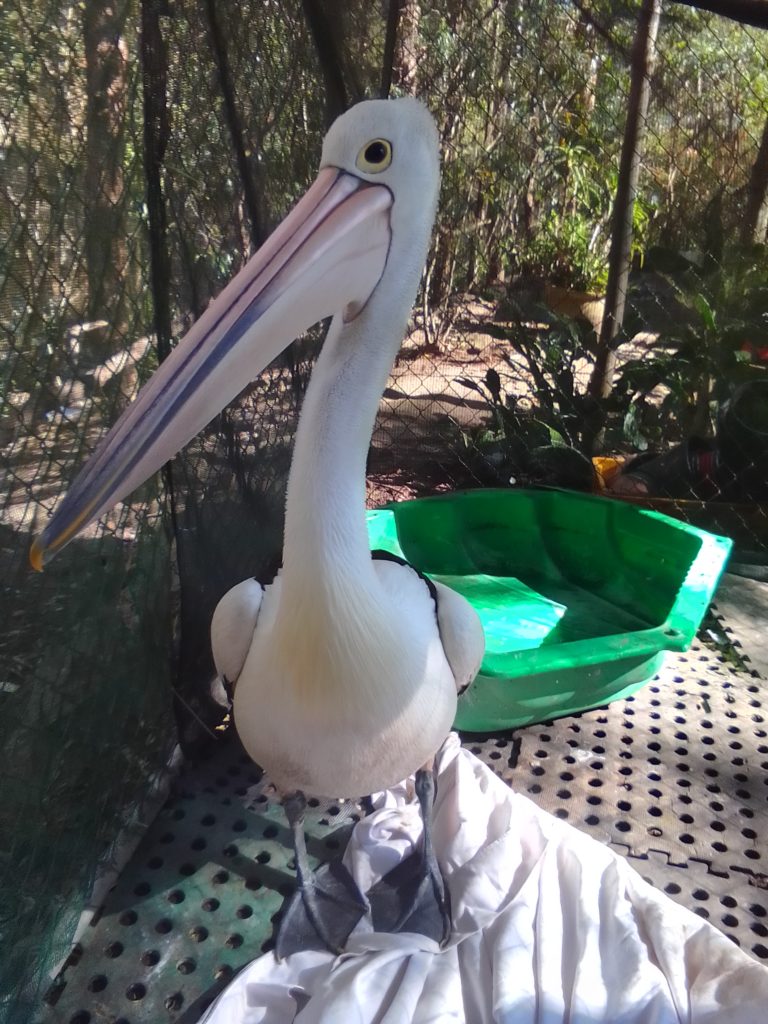Wendy Gillespie of Pelican Rescue and Research recently rescued an adult male pelican which had been fully incapacitated by fishing entanglement during the recent school holidays.
He was spotted on the sandbar at The Entrance collapsing, so Gillespie paddled him out in her kayak as he couldn’t fly, with multiple infections and starving.
“Emergency veterinary care was sought from the Wonderful Team at ARH West Gosford,” she said.
“They spent significant time cleaning up his wounds, one needing surgery due to a longer-term infection from tackle damage, and the other joint requiring a second course of antibiotic treatment due to damage from hooks and fine line.
“A fortnight of intensive care was needed to manage infections with two sessions of surgery performed by ARH, antibiotics, pain relief and also IV fluids and probiotics were needed in order to bring his system back up.
“During his second week in care he was strengthening his wings, preening obsessively, self-feeding on whole mullet and finally able to use his legs.
“He has unlikely not been able to fly for at least three weeks.
“He was eventually marked and released so he can be monitored in the wild and assisted in anyway if needed.”

Gillespie said leg injuries in pelicans and other aquatic birds, particularly hooks and lures in joints can be life threatening, as paddling to catch fish is greatly impeded.
“Many pelicans throughout the Central Coast are parents, so if they’re unable to forage their young are also at risk of starvation through abandonment,” she said.
“It takes both parents to raise one young as they’re supplemented by both adults until they’re full size before becoming independent.
“If one parent doesn’t return their partner will abandon young within a few days.”
Gillespie said every holiday period leaves a huge legacy on the Coast’s wildlife, particularly birds due to recreational fishing interaction and discard.
“The clean up can take many weeks with time being of the essence to help save many birds with internal tackle, and with significant entanglements and injuries,” she said.
“Aquatic birds are impacted not only through direct fishing interaction, but also due to entanglement in discarded gear including line and hooks.
“Of course any birds on the ground can suffer with feet and leg entanglements and amputations.
“Currently both a piwi and a crested pigeon pair at Gosford waterfront all have feet entanglements and amputations.
“During half an hour at the Entrance North recently, both pelicans sighted had line around wings and two native ducks had internal tackle with line hanging out of their bills.
“I had returned to this location as I was tracking a critical female pelican with a huge lure in her pouch and neck which is unlikely to have survived due to this lethal legacy.”
Gillespie said the greatest damage is often done when fishers remove tackle from bird’s joints – particularly when cutting it out.
“Fishers are requested to never remove tackle from joints and never cut tackle out of birds,” she said.
“Where possible contain the bird, cover with a towel in a confined, secure place and call a rescuer immediately to pick up and transfer the bird to the vet.
“If you’re unable to provide assistance alert rescuers as soon as possible to the presence of the bird needing attention with adequate detail including location, description of the tackle attached, if a large or smaller pelican, and if it’s light coloured which means it’s a young bird.
“If you do have to cut lines off please leave at least five metres of line attached without weights or lures or floats, as it gives rescuers a much better chance of rescue by grabbing the line.
“If joint injuries don’t receive early veterinary attention they can become septic, arthritic and life threatening.”
Gillespie said the one pelican rescue alone cost her $500 in medication and associated care and rescue costs, and a fortnight in stress and time.
“Many members of the public are under the misconception that wildlife welfare costs are borne by our wonderful, hard-working vets,” she said.
“Vet practices give a large amount of their time and resources free of charge but they don’t shoulder the entire burden, with the rest being shouldered by rescuers and carers.
“These costs should be funded by Central Coast Council and/or State Government, fishing licences, recreational fishing grants and/or from a tourism levy but they are not.”
Any assistance from caring Coasties towards ongoing costs will be graciously appreciated and acknowledged.
“I average 100 pelican rescues per annum and as many adults are parents their young are also being saved,” Gillespie said.
“Many more birds are needing rescue post holidays, but the impacts year round have intensified across the Coast.”
If you’d like to make a donation contact Gillespie on 0458 975 498 or via pelicanrescueandresearch@gmail.com
Source:
Wendy Gillespie, Pelican Rescue and Research


